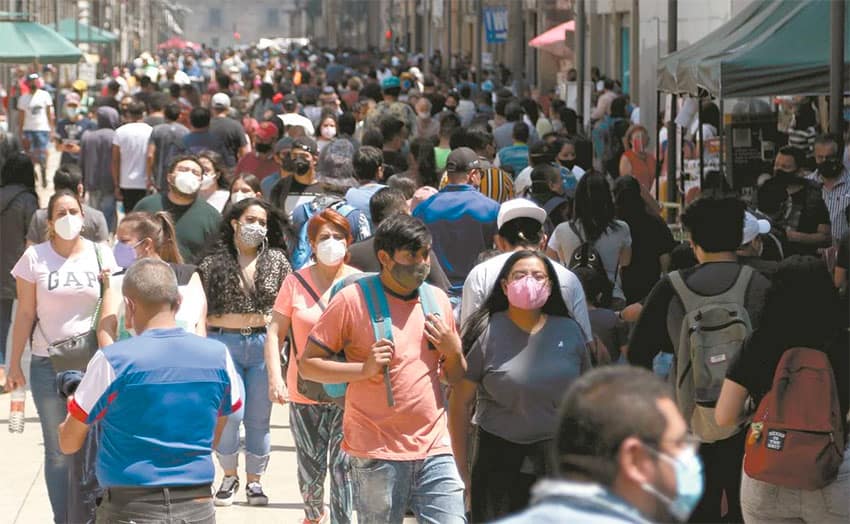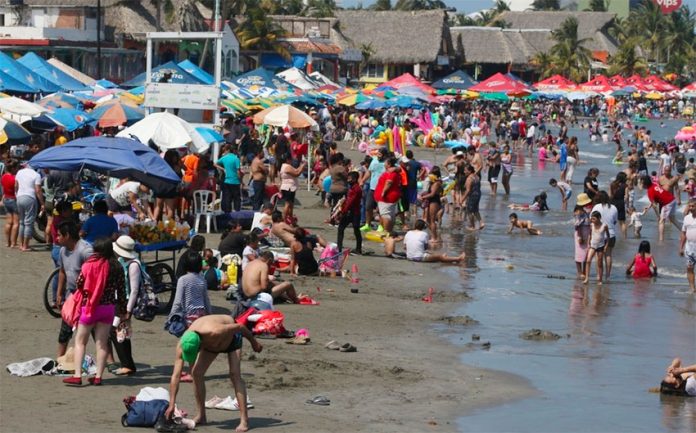New coronavirus cases have declined significantly since Mexico went through its worst month of the pandemic in January but a resurgence of the national outbreak is not out of the question after people flooded streets and flocked to beaches over the weekend.
Average daily case numbers declined 28% to 5,668 during the first 14 days of March compared to February and were 60% below the average in January, a month in which Mexico recorded more than 438,000 confirmed cases and almost 33,000 Covid-19 deaths.
Perhaps believing that the worst of the pandemic is over and that the risk of infection is now substantially reduced, hordes of people descended on Mexico City’s historic center over the long weekend (Monday is a public holiday for the anniversary of former president Benito Juárez’s birthday) while thousands headed for the beach in states such as Guerrero, Veracruz, Yucatán and Sinaloa.
In the capital, where the coronavirus risk level remains at orange light high on the federal government stoplight map, residents and visitors were out in force on Sunday, many strolling carefree down Calle Madero, a pedestrian street that runs between the Palace of Fine Arts and the zócalo, Mexico City’s central square.
Restaurants and shops downtown were also busy in stark contrast to the long red light maximum risk period the capital endured from the middle of December to the middle of February.
“There are more people, it must be because of the long weekend,” a policewoman told the newspaper El Universal. “… I think they don’t care about the pandemic or they think that it will be over in a few months.”
The city’s stoplight color and authorities’ warnings about the ongoing risk of infection mean nothing to many people, she added.
Also taking advantage of the long weekend despite the pandemic were throngs of beachgoers in destinations such as Acapulco and Zihuatanejo in Guerrero, the port city of Veracruz, Progreso and Celestún in Yucatán and Mazatlán in Sinaloa.
The newspaper Reforma reported that many people failed to observe social distancing recommendations while enjoying the sand and sea.
Guerrero Governor Héctor Astudillo said in a video message that there was a “notable” number of visitors in the state’s two main coastal destinations – where hospital occupancy was around 50% – and warned tourism sector businesses to remember that the risk of infection remains “very real.”
He also said he was lobbying the federal government to ramp up vaccination efforts in Guerrero before the upcoming Easter vacation period.

In Mazatlán, hotel occupancy over the weekend was 75% to 80%, according to local hotel association representative José Gámez Valle.
“There were beach hotels with 90% occupancy,” he said, explaining that many people took a last-minute decision to have a short break on the Sinaloa coast.
“Mazatlán was packed yesterday [Saturday] and today [Sunday] as well,” Gámez told the newspaper Noroeste.
“… Next weekend is also looking good,” he said, adding that the influx of visitors is “good practice for Holy Week.”
Indeed, some businesses in Mazatlán need to improve their observance of health protocols as a number of them, including restaurants, were observed in violation of basic measures designed to stop the spread of the coronavirus, which has sickened at least 2.1 million Mexicans and officially claimed the lives of about 195,000, figures widely considered to be vast undercounts.
With the start of Holy Week just two weeks away, Health Ministry official José Alomía took the opportunity at Sunday night’s coronavirus press briefing to warn that Mexico could see a new, large coronavirus outbreak if mobility increases and people don’t follow measures to stop the virus’s spread.
The director of epidemiology said that the reduced risk level in many states – 21 of Mexico’s 32 states are now medium risk yellow and three are low risk green – doesn’t mean that people should go back to living their lives as they were before the onset of the pandemic just over a year ago.
“While there are people who haven’t gotten sick, in other words people susceptible to infection, … we can have new outbreaks,” Alomía said.
“… And if there are new outbreaks … we’re going to have seriously ill people who require a general hospital bed or a bed with a ventilator and unfortunately we’re going to have people who die due to [Covid-19] complications,” he said.
Alomía urged people not to drop their guard and recommended that people stay at home over Easter and not attend extended family gatherings.
“We want to invite the public to have a calm Holy Week, … celebrate [only] with close family and avoid infections in that way,” he said.
Covid-19 vaccines continue to be rolled out across many parts of the country but based on current indications it will at least be several months, if not longer, before Mexico reaches the level of immunity in the population required to bring the pandemic to an end.
About 4.3 million vaccine doses had been administered as of Sunday night, according to Health Ministry data, mainly to health workers and seniors.
Mexico has only given 3.4 vaccine doses per 100 people and only 0.5% of the population is fully vaccinated, meaning that they have had both of the required shots of one of the four vaccines that have been used here since inoculation began on December 24.
Some health experts estimate that 70% to 90% of the population needs to be inoculated or infected with the virus to reach herd immunity. For that to occur, a minimum of around 90 million Mexicans – the country’s population is just over 126 million – would need to have Covid-19 antibodies generated either by infection or inoculation.
Although tens of millions of Mexicans may have already had the coronavirus, with at least tens of millions more still susceptible, Mexico’s pandemic – one of the worst in the world – looks unlikely to end any time soon.
Source: El Universal (sp), Reforma (sp), Noroeste (sp), Excélsior (sp)
